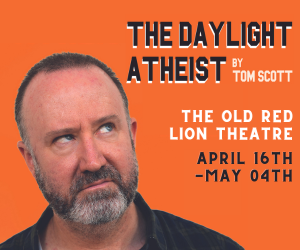The adaptation feels gratuitously, stubbornly long.
The incoming audience are confronted, facing us, by a grid of white chairs. On some are strewn costumes, and underneath all are pairs of shoes. In the middle, the shoemaker Doctor Manette sits. He is also behind a typewriter because he is played by Blood For Blood’s adaptor Jonathan Holloway.
Holloway’s script, however, has nowhere near the orderliness of this set: an audience not familiar with the book would find it extremely difficult to follow. The book begins in France in the 1770s, yet designer Neil Irish has costumed the play in what reads like an approximation of the 1920s with hints of mid-twentieth century. All of the working-class French characters have northern English accents and I was not aware of any French locations being mentioned until almost halfway through the show. To make matters more confusing, Edinburgh is mentioned, seemingly arbitrarily, near the start. Could the two cities be London and Edinburgh in this production? The audience may well think so for the first thirty-five minutes.
Era-specific details are mentioned: the use of the word “citizen” as a revolutionary greeting; the “revolution” itself. However, Dickens’ dialogue (despite keeping much of its laborious sentence structure) has been modernised, mostly by adding the word “shit” intermittently throughout. The audience cannot tell whether this production retains the original setting; or whether it transposes it into a new one, whatever that new one may be. Especially since the script strains towards naturalism, it wants for more clarity.
When a character, fifty minutes in (fifty!) shouts that it is, indeed, “1789”, the issue is finally resolved; but the choices of writing and design are, therefore, all the more puzzling. Furthermore, Blood For Blood has time to tell us where and when it is set. The adaptation feels gratuitously, stubbornly long. It even retains dialogue in which characters recite recent plot events to each other: useful enough for A Tale of Two Cities’ originally serialisation; frustratingly obsolete in a one-act theatre production.
Holloway makes stranger choices too. Having put himself as Manette centre stage for the whole play, Manette’s character is heavily cut. Whilst the staging suggests he is (literally) central, the script reduces him to the status of a device in the arcs of his daughter (an impressive Abby Wain), her husband Charles Darnay (a shouty James Camp) and her lover Sydney Carton (an excellent Graeme Rose - the play’s standout performer).
There are some good things here. Rose’s performance, for one, which manages to naturalise the script amicably, whilst infusing each of his characters with real emotional weight. Not only is the multi-roling generally excellent, the visual similarity of Carton and Darnay - on which the plot relies - is achieved remarkably well. At one point, I could not even tell Rose and Camp apart. Composer Sarah Llewellyn has also done a superb job on directing the music, with some aurally arresting backing singing provided by the cast below some monologues.
Yet, for all this, the most fitting summary of A Tale of Two Cities: Blood For Blood might be those chairs, a row of which, by the end of the performance, lay destroyed on the floor: pale, rigid and, in places, rather flat.









